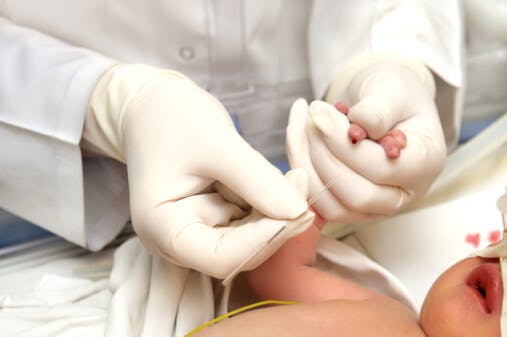Newborn Screening Tests

Question
What are the common blood tests done in the newborn period immediately following birth, such as PKU Screening?
Cheryl Hall-Harris - RN - Overland Park, Kansas
Dr. Greene's Answer
In the first hours of life, a baby experiences so many things for the very first time. She finally has the opportunity to see the mother whose voice has been keeping her company for so long. He experiences his first breath of air, his first touch, his first kiss, his first gaze. She has her first taste of food. Why must all of these wonderful “firsts” be hampered by the first needle stick?
In the United States, all babies are required to have a blood test shortly after birth to screen for several serious diseases. The purpose of screening is to protect children with these diseases before any symptoms arrive. In order for a test to be included in the newborn screen, the associated disease should be relatively common in the screened population, the consequences of the untreated disease should be substantial, and the test should be accurate. In addition, cost effective treatment must be available that results in significantly better outcomes when used before symptoms ever develop. Using these guidelines, several tests have made it into the newborn screen.
Some form of newborn screening is mandated in all states, but the components of the newborn screen vary from state to state. Phenylketonuria or PKU is screened in all states. It causes severe mental retardation, which can be prevented quite readily if the condition is detected before symptoms develop and the child is treated with a special diet. Testing is also done for hypothyroidism, which can likewise lead to mental retardation if not detected early. Affected individuals can be easily treated with supplemental thyroid hormone.
In California, the newborn screen also includes testing for galactosemia and sickle cell anemia. Other common screening tests include those for possible HIV infection, adrenogenital syndromes, cystic fibrosis, homocystinuria, maple syrup urine disease, and other organic or amino acidopathies.
The test involves pricking the baby’s heel to obtain a small blood sample, which is then sent to a special laboratory for the testing. The test is best done as close as possible to the time of discharge from the hospital. Every hour a test is done before twenty-four hours of age, the test becomes less accurate (another reason why early discharge of newborns is not a good idea). If the test is done before twenty-four hours of age, discuss having a repeat blood test with your pediatrician. If needed, a repeat blood test should be done some time before your baby is three weeks old.
The results of the newborn screen usually take a few weeks to come in, but should be available at the time of your baby’s one-month physical.
More information about newborn screening testing by state can be found on the website for the National Newborn Screening and Genetics Resource Center.
You also have the option of having your baby screened more thoroughly for inborn errors of metabolism. This group of 30, individually rare, disorders can cause mental retardation, coma, or death. Many of these disorders can be treated with something as simple as a dietary change, if you know which diseases children have soon enough. Previously, testing for each of these conditions has been too complicated and expensive to be practical. Now here is an exciting, new screening test that costs only $19-$25 and can spare families the ravages of undiagnosed inborn errors of metabolism.
Some states already require that parents be offered the option of the new tests. I encourage parents living elsewhere to arrange for testing themselves. If the tests are not available locally, ask your doctor to call Mayo Medical Laboratories (800-533-1710) or Baylor University Medical Center (800-422-9567). The test simply involves taking a little extra blood at the time of the routine heel-stick for newborn screening.
Blood tests aren’t the only important kind of screening for newborns. Every baby should have one thorough physical examination within the first twenty-four hours of life to screen for such problems as heart murmurs, developmental hip dislocations, rare tumors such as retinoblastoma, and many other findings which are important to discover early.
If you take your baby home less than twenty-four hours after delivery, it will be important to have the baby examined again later that week to check for signs which may not have developed by the time of discharge.
A new baby arrives with incredible potential for a life that can go so many ways. Newborn screening is a way to help prevent children from being needlessly robbed of their potential before they even have a chance.


